/ Full archive
Civic Media Hub launches ‘Innovation Lunches’
A catered lunch will be provided. Events are open to all staff and students, but places are limited. RSVP to attend an innovation lunch to afeigenbaum@bournemouth.ac.uk
Exploring Methods for Investigating Algorithms and Data Processes w/ Lina Dencik (Cardiff University)
Wednesday December 7th @ 13:00-14:00 F305 (Fusion Building, Talbot Campus)
As algorithms tell us what we want to watch and predict the years we have left to live, few aspects of our social, cultural and economic lives are left untouched from data processes. Despite popular claims, this datification of society is never neutral. What does it look like to study data as emerging sets of power relations? How can we approach algorithms as social processes? Join us for an interdisciplinary discussion on methods for investigating algorithms and data processes.
Bio: Dr Lina Dencik is Senior Lecturer and Director of the MA in Journalism, Media and Communication in the School of Journalism, Media and Cultural Studies at Cardiff University, UK. Her research is concerned with the interplay between media developments and social and political change, with a particular focus on globalization and resistance. She has recently been working on issues relating to surveillance, visibility, and the politics of data. Her most recent book is Critical Perspectives on Social Media and Protest: Between Control and Emancipation (co-edited with Oliver Leistert, Rowman & Littlefield International, 2015).
Sharing undergraduate research: how SURE led one student to Norway and beyond

Next year Bournemouth University will be hosting the British Conference of Undergraduate Research, an international showcase of research from undergraduates of all disciplines. Students submit an abstract and if accepted to the conference, have the chance to share their work through a poster, oral presentation or art displays. It’s a great opportunity to get an insight into academic life and develop key skills that will be of benefit no matter which career they end up in.
Charlotte Fodor, a recent graduate from the Faculty of Media & Communication took part in this year’s Showcasing Undergraduate Research Excellence (SURE) – BU’s internal research conference. Below she shares her experience of taking part and how it’s helped her career to develop.
I am recent graduate who took part in this year’s SURE conference. I presented my research, which explores the representation of disabled people in literature, and was delighted to be awarded a prize for the best presentation.
My prize enabled me to attend a conference related to my research interests. This led to me applying and being accepted as a speaker at a conference in Bergen, Norway. I used the funding I won through taking part in SURE to pay for my travel costs.
It was my first time in Norway and I stayed in Bergen for three days. It was a beautiful, welcoming place; with rolling mountains, intricate sculptures, and pastel coloured buildings.
The conference, known as “Gender, Body, and Health”, was organised by the Nordic Network and hosted by the University of Bergen. I met a variety of academics and speakers from all over the world: from America, to India, to Sweden, to Germany, who introduced me to exciting ideas and perspectives that I had never considered before. These are just a few examples of the fantastic topics that I had the chance to learn about. Discussions on whether or not Literature could evoke a DeafBlind experience; Universal Design and Disability; the Female, Disabled body in India; Disability and the Art of Quiet Protest…
SURE was the first conference that I spoke at and it led me to Norway. I sincerely consider SURE to be a stepping stone towards my aims for the future.
Taking part in opportunities like SURE will stretch your mind. You will have to think on the spot during the Q&A, and figure out your time management (you can only talk for a limited amount of time. I had to condense my 10,000-word dissertation into a paper that lasted for 10 minutes). It will also help you to develop as an independent researcher and enrich your C.V.
Whether, like me, you want to pursue academia further; or, you are preparing for the job market, taking part in SURE will cement the skills you need for the future and has the potential to open more doors for you that you may not have considered.
Visiting Bergen and networking was an exciting adventure, and it was a great kick-starter for my Postgraduate research, which I’m now underway with at the University of Southampton!
To find out more about taking part in the British Conference of Undergraduate Research or to find out how your students can submit an abstract, visit www.bournemouth.ac.uk/bcur17
The Research Photography Competition is back for 2017 and set to be the best one yet!

Following on from the success of the previous two years, we’re delighted to announce that the Research Photography Competition will be returning for its third year. The competition is part of our activities to engage BU students with research.
Over the past two years we’ve set BU academics the challenge of telling the story of their research, through a single image. This year we want to focus on the impact that your research can have or will have outside of academia. Not only this, we want both our staff and student researchers getting involved, from across the university. Whether you’re at the early stages of your research or it has come to the end, we want you to get involved and showcase the impact your research has had or will have through a single image.
How do I enter?
It’s easy! Pick up a camera and capture an image or use one you already have. You can be as creative as you like with your images and capture any area of your research, in relation to its impact.
Once you have, all you have to do is submit it to us via email (research@bournemouth.ac.uk) by Wednesday 25 January 2017, along with a 100 – 200 word description of your research behind the image.
Voting will then go live in February. Staff, students and the general public will be able to vote for their favourite image. The competition winners will then be presented with a small prize by Professor John Fletcher in the Atrium Art Gallery, in March 2017. You’ll get a chance to view all the competition entries in the Atrium Art Gallery and online after the event too!
Taking part is a great way to showcase your research and grow your academic profile both in and outside the university. As well as raising awareness of your research, you’ll be in for the chance of winning some Amazon vouchers!
Each image will need to be:
- 300ppi (pixels per inch)
- with physical dimensions equivalent to an A3 size piece of paper
| Millimetres | Inches | |
| Portrait (width x height) | 297 x 420 mm | 11.7 x 16.5 in |
| Landscape (width x height) | 420 x 297 mm | 16.5 x 11.7 in |
Need Inspiration?
Then take a look at our Photo of the Week, where you can read about the research behind the images.
Should you have any queries about the competition, then get in contact with Hannah Jones in the Research and Knowledge Exchange Office.
For more information, take a look at the Research Website.
Please read through the Terms and Conditions
Support for developing your event idea – Drop-in session Wednesday 23 November
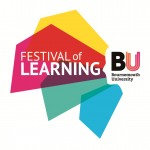 Don’t miss our drop-in sessions where we can offer you support in planning your event for Festival of Learning 2017.
Don’t miss our drop-in sessions where we can offer you support in planning your event for Festival of Learning 2017.
Our next session is on Wednesday 23 November and we’ll be there for you from 2pm-3pm at Poole House Atriume.
Come to see us and don’t miss out on the opportunity to share your research and expertise by being a part of the Festival!
We’re hoping to see you there!
HE policy update
Higher Education and Research Bill – The bill will reach the report stage on Monday 21st November, and a long list of new amendments have been proposed. The amended version of the bill following the committee stage is here. The list of amendments is here (although it is being updated daily so best to look here)
The government’s own amendments were described by Jo Johnson in a blog on Wonkhe – an unusual and interesting step.
- At least one member will be added to the OfS board who has experience of representing the interests of students – which has been welcomed especially by the NUS, who ran a high profile campaign on this issue
- The OfS would have a new duty to monitor the financial sustainability of the sector.
- Amendments to restrict the ability of the Secretary of State to frame guidance etc in relation to particular course of study that would lead to the OfS to perform a function in a way which prohibits or requires the provision of a particular course of study.
- The requirement for all registered providers to publish student protection plans and bring them to students’ attention. How this develops is likely to be linked to the separate consultation on credit transfer – we are expecting a response on this soon
- Changes relating to UKRI including the addition of postgraduate training in UKRI’s functions.
The other amendments proposed are also interesting – including amendments relating to Brexit and immigration issues, and student loans, rather than matters directly covered by the Bill, but which show the direction that the debate may be going to take – e.g. on student loans, using TEF as a measure of quality for immigration controls on student numbers, monitoring international staff and student numbers and requiring Parliamentary approval for the TEF. See our summary on the intranet pages here
The House of Commons library produced a useful briefing on the committee stage of the HERB on 16th November 2016. The written evidence and transcripts of the Committee’s sittings are available on the Higher Education and Research Bill 2016-17 page of the Parliament website. This includes BU’s submission – we were one of only 11 HE institutions to submit individual responses (out of 63 sets of evidence).
Separately, the government published guidance on how UKRI and the OfS would work together.
Teaching Excellence Framework – The HEA have published their literature review on “defining and demonstrating quality teaching and impact in HE” – which was announced in March when we were all grappling with the TEF year 2 technical consultation. It notes “the lack of robust empirical evidence found by this review” “with the literature dominated by opinion pieces based on secondary, documentary analysis rather than rigorous comparison group studies.” The review therefore points for a need for more implementation research but also a shared understanding on what “quality teaching” in HE is and why it matters, and then on how to measure it. With that caveat in mind, it sets out what the indicators are, from the literature, showing an interesting correlation with TEF criteria. I’ve put the list of criteria on the TEF pages on the intranet. The review looks at student/alumni feedback as measure of quality and refers to a number of publications that question whether student satisfaction is a good proxy for quality, although it may support quality in institutions as a robust mechanism for feedback.
Brexit – The House of Commons Science and Technology committee’s report into leaving the EU has been published. Read my seperate blog on the BU research blog here – it calls for more reassurance on staff mobility and funding and a Chief Scientific Adviser in the Department for Exiting the EU.
International Students – There has been much activity this week – some of it is reflected in the amendments to the HE and Research Bill as noted above – many of those filing amendments to the Bill spoke in the Westminster Hall debate
- The House of Lords discussed overseas students on 17th November (see Hansard here). The discussion included a great deal of support for allowing international students to come to the UK, support for removing them from the migration statistics, and criticism of suggestions that quality measures (including the TEF) should be used as a mechanism to determine policy. A better measure of actual overstayers (rather than the current estimates) would be helpful. There was much concern about the UK sending unfriendly messages to the rest of the world.
- There was a Westminster Hall debate on 16th November – you can read the House of Commons briefing paper on international students prepared for that debate. During that debate (see Hansard here):
- Shadow home secretary Diane Abbott confirmed Labour policy was to remove international students from Home Office migration statistics, saying not only would this make the statistics more accurate in relation to people who were subject to immigration legislation but it would also “contribute to the detoxification of this area of British society and political life”.
- Stuart C McDonald (SNP, Cumbernauld, Kilsyth and Kirkintilloch East) He thought the Government’s official ambition for education exports to be worth £30bn by 2020 was unlikely to be met, and questioned the accuracy of the international passenger survey statistics that 90,000 students were not leaving when their courses ended
- There were comments criticising the negative rhetoric around immigration generally
University finance – UUK have launched an interactive tool looking at University spending – responding to the HEPI student experience survey last year that reported that 75% of students did not feel that they have enough information on where their fees are spent – something that is of concern when so many students also have concerns about value for money (only a third said that they are receiving good or very good value for money) – something that is cited by the government regularly. It is worth noting that BU has a very clear explanation of our own finances on the website that was developed alongside SUBU last year to make sure that we are presenting helpful information in a clear way.
Social mobility and widening participation – A report by the Social Mobility Commission was issued this week. The report includes a series of conclusions and recommendations. Specifically relevant to universities, it recommended introducing an annual social mobility league table for universities, and ensuring that there is HE local provision in all areas of the country. The prior attainment issue (at GCSE) affecting HE access is one that has been highlighted a lot recently – and is one of the factors behind the schools policy that is currently out for consultation. HE “cold spots” have also been identified as an issue, and the focus on local geography is consistent with the approach that is being taken by the government, most recently with the National Collaborative Outreach Programme, targeting specific post-codes and linked to measureable outcomes, and Justine Greening’s announcement of new “opportunity areas” at the Conservative Party conference, so it will be interesting to see what the reaction is.
Student Finance – consultations
The government consulted in 2015 about extending loans to PGR students on means-tested basis and announced with the 2016 budget that they would launch a technical consultation on the detail, which has been launched with a closing date of 16th December 2016 (Consultation on postgraduate doctoral loans). BU is preparing a response to this consultation – please contact policy@bournemouth.ac.uk if you would like to be involved and read the summary here.
In the Autumn Statement in 2015 the Government announced it would introduce new undergraduate part-time maintenance loans to support the cost of living while studying. The Part-time Maintenance Loans Consultation seeks views and evidence on the introduction of the part-time maintenance loan. Please contact policy@bournemouth.ac.uk if you would like to contribute and read the summary here. The consultation closes on 16th December 2016.
Science and Technology Committee – Leaving the EU report
The House of Commons Science and Technology committee’s report into leaving the EU has been published.
To quote the main points from the summary:
- “The Government has provided some helpful and welcome short-term reassurances in relation to underwriting EU funding for research and maintaining access to student loans, but the Government’s strategy for communicating these recent announcements is insufficient.”
- “we are not convinced that the needs of science and research are at the heart of the Department for Exiting the European Union’s (DExEU) thinking and planning for Brexit. Science should have a strong voice as part of the negotiations. DExEU needs a Chief Scientific Adviser urgently. The Government should also involve the interim Chair of UK Research and Innovation (UKRI)”
- “the Government should now act to reduce uncertainty by setting out a vision for science. This should include commitments to raise science expenditure as a percentage of GDP (as we have previously urged). It should also include measures to attract skilled researchers and students, to be taken forward in Brexit negotiations separately from immigration controls more broadly, and should include an immediate commitment to exempt EU researchers already working here from any wider potential immigration controls.”
- “The Government must also seek to capitalise on the opportunities of Brexit, including in terms of setting regulations to facilitate accessing markets and research collaborations beyond the EU.”
On the EU funding guarantee, the report concludes that this is helpful to provide reassurance but that it doesn’t go very far, because it would be strange if the EU were not required to honour its contractual commitments under awards made before the UK leaves the EU and so it is unlikely that there will ever be a call under the guarantee. However, given that there was widespread concern – whether justified or not – in the summer, the guarantee has been given in order to encourage people to keep bidding and to provide reassurance of the government’s commitment to mitigating these potential direct negative effects of Brexit. However, if this is its main purpose, the report notes that it hasn’t really been communicated very well – hence the high level point noted in the report’s summary.
What matters to science and research? The report highlights 5 main issues:
- Funding – e.g. on-going participation in H2020 after Brexit or a UK replacement for it
- People – guarantees for those already here and attracting EU researchers after Brexit, and Erasmus
- Collaboration – being able to participate in international projects and influence the EU research agenda
- Regulation – influencing EU regulation which might otherwise stifle innovation
- Facilities – access for UK researchers to EU facilities
Note on people that the Education Committee are running a separate inquiry into the impact of Brexit on staff and students, and we have just submitted evidence – read it here. The report notes that it is not clear whether Brexit will mean that EU staff become subject to the same controls as international staff – and of course there is about to be a new consultation on what the controls for international employees are going to be.
The report calls for a specific guarantee for staff already in post. Note that Jo Johnson made helpful noises about this in the House of Commons this week – he “expects” that this assurance will be given but it depends on reciprocity (so it will come later in the negotitations?).
Digital Me pop-up exhibition (ESRC Festival of Social Science)
The Digital Me pop-up photo exhibition took place on 5th November. The event was part of the ESRC Festival of Social Science and took place at Sovereign Shopping Centre.
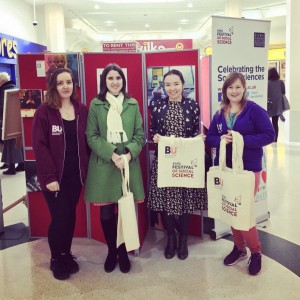
Dr Elvira Bolat and Dr Parisa Gilani were lead organisers of the event with the help of incredible Knowledge Exchange & Impact Team made the event an absolute hit: over 243 people engaged with the event and learnt about Bournemouth University’s research into digital. In particular, visitors were interested in the following three topics: digital addition, slacktivist behaviour, and age difference in consumption of mobile social media.
Famous and incredible Howard Potter visited us. Do you know who Howard Potter is? Check this: https://www.youtube.com/watch?v=vYpeVBV
Check photos, full research behind each photo as well as photo commentary of the day on https://digitalmebu.wordpress.com/
Research featured on the microsite and via images was a collection of studies conducted by staff and students from the Faculty of Management, Faculty of Science and Technology and Faculty of Media and Communications.
Student Research Assistants – awarded projects
All assessments are now in and the awarded Student Research Assistantships (SRA) are as follows:
Prof Adele Ladkin – Exploring Work-life Balance in the Hospitality Industry
Prof Alan Breen – Spinal image Processing Assistant
Prof Alison McConnell – Modelling the effect of slow breathing on the human cardiovascular system
Dr Anita Diaz – Enhancing public engagement with co-creating science through our science co-creation website
Dr Ann Luce – Student Research Assistant
Dr Anna Feigenbaum – Data Journalism, Policing and Human Rights
Dr Ben Thomas – Hydropower Test Rig Student Research Assistant
Dr Caroline Jackson – Professionalisation of Events Researcher
Dr David John – 3D developer: Reconstruction of Skorba Prehistoric Temple, Malta
Dr Elena Cantarello – Engaging staff and students in pro-environmental behaviours in the UK higher education sector
Dr Emma Jenkins – Research Assistant: Understanding Early Communities in the Near East
Prof Genoveva F. Esteban – Student Research Assistant
Dr Isabella Rega – Mobile Technologies and Telecentres in Latin America: Investigating Synergies and Convergence
Dr Ishmael Tingbani & Dr David Botchie – Student Research Assistant
Dr James Gavin – Daily Activities as Training Exercises for Orthopaedic Patients
Dr Jamie Matthews/ Dr Nael Jebril – Societies in Flux
Joyce Costello – Investigating Pro-Social Behavior of Media Employees
Dr Karina Gerdau-Radonic – Identifying individual and group identities through mortuary treatment
Prof Kerstin Stutterheim – Media history research & Assistance for curating a scientific film program + publication
Dr Lee-Ann Fenge – Collecting stories about health and well-being
Dr Luciana S. Esteves – Coastal Sediment Database
Dr Mel Hughes – Older male carers research assistant
Dr Melanie Klinkner – Between Science and Human Rights: forensic excavation and their value for Truth Commissions
Dr Nigel Williams – Network Analysis of Destination discourse
Dr Peter Hills – Development of the Facespan
Dr Richard Wallis – Becoming A Media Worker
Dr Rosie Read – Creating online resources to showcase BU students’ ethnographic research
Dr Salvatore Scifo – Delivering Community Radio
Dr Samuel Nyman – NHS Quality Improvement
Dr Shamal Faily – CAIRIS
Dr Sue Sudbury – Participatory Filmmaking
Dr Tim Breitbarth – Sport and Society: Public Perceptions and Social Media Conversations about the Social Value of Sport
Dr Viachaslau Filimonau – Food donations in the UK grocery retail sector – The role of local charities
Prof Wen Tang – Data Game – Location-based Story Generation and Guidance
Please promote these vacancies to students where applicable. All jobs are live on MyCareerHub, our Careers & Employability online careers tool. You will need to use your staff/student credentials to login.
There will be another round of applications for academics to apply for funding for an SRA in February. Please do look out for updates on the BU Research Blog.
If you have any questions about this scheme, please contact Rachel Clarke, KE Adviser (KTP and Student Projects) on 61347 or email sra@bournemouth.ac.uk
BU Academic Delivers Invited Talk at a United Nations Organised Event in Turin, Italy
Dr. Dinusha Mendis, Co-Director of the Centre for Intellectual Property Policy and Management (CIPPM) was invited to deliver a talk on her research into Intellectual Property and Emerging Technologies, with a focus on 3D printing at an event organised by the UN Agency, World Intellectual Property Organisation (WIPO) and University of Turin, Law School, Italy. The talk was delivered on 24th October 2016.
The event which formed part of the Master of Laws Programme, offered jointly with the World Intellectual Property Organisation (WIPO) Academy and University of Turin, was hosted in collaboration with the International Training Centre of the International Labour Organisation (ITCILO) with financial support from the Government of Italy and was attended by academics, practitioners and officials from WIPO and ITCILO.
Dr. Mendis spoke about the legal status surrounding 3D printing, with a particular focus on the funded research carried out for the UK Intellectual Property Office ( completed 2015) and the current AHRC funded project titled ‘Going for Gold’ exploring the intellectual property implications surrounding 3D scanning, 3D printing and mass customisation from the point of view of cultural and business sectors.
Other speakers at the event included, Ms. Martha Chikowore (WIPO Academy, Training Officer), Mr. Ralf Kruger (Manager, Turin School of Development), Professor Alessandro Cogo (University of Turin), Professor Marco Ricolfi (University of Turin), Mr. Paolo Marzano (LUISS, University, Rome) and Dr. Thomas Margoni (CREATe, University of Glasgow).
Successful HEA Reaccreditation
The Higher Education Academy (HEA) has reaccredited TeachBU and the PG Certificate in Education Practice until 2020 as routes to gaining national recognition as HEA Fellows. HEA Fellowship is an international recognition of a commitment to professionalism in teaching and learning in higher education and demonstrates that education practice is aligned with the UK Professional Standards Framework (UKPSF). To date over 75,000 individuals have become Fellows of the HEA.
The Accreditation Panel commended Bournemouth University on its commitment to the professional development and recognition of all staff that teach and support learning and the Academic Career Matrix, which further embeds the UK Professional Standards Framework within HR policies and processes.
They commented that the Centre for Excellence in Learning (CEL) is a driver of significant change and improvement across the institution and promotes research-engaged teaching which is aligned with the UKPSF. They also felt that there is an impressive infrastructure in place to support and develop the TeachBU provision and that participants are well supported by the clear guidance provided in the handbook which explains the requirements of each descriptor very well. Processes are well defined and the templates provided support applicants to structure their application to present the evidence of practice required.
We now have over 60% of BU academic staff with either HEA Fellowship and/or a recognized teaching qualification, with the ambition of raising this to 100% by 2018. Further details about TeachBU are available online here (via the ‘Working at BU’ tag on the staff intranet), together with details about upcoming introductory sessions and submission deadlines.
Dr Sue Eccles
November 2016
New Paperback Edition – Stories of the Hard Copy
I just wanted to share some good news, I have just found out from Edinburgh University Press that just after a few months of the hardback release of my book Straight Girls and Queer Guys: The Hetero Media Gaze in Film and Television (that was written while on study leave, funded by Fusion) that they are going to bring it out in paperback. As we all know getting your academic book published in paperback is not necessarily an easy task. Many publishers want to publish in hardback as the first edition, as this achieves a higher value of sales when offering the books to libraries. Also I have to confess myself that a hardback edition often is a handsome prospect, as the product may well last longer, and you can put in a place of pride on your bookshelf collection. That said, a paperback edition is very desirable, as students might be able to afford their own copy, and maybe general audiences might take interest. Some publishers leave it a while before they will consider the prospect of a paperback edition. For example my second book Gay Identity, New Storytelling and The Media originally came out in hardback edition, and it took almost three years before they considered a paperback edition. This however was not an easy prospect, I had to argue why the book should come out in paperback, including collating reviews that were made of the book, and also finding lecturers and teachers that were using the book in university or schools, and then presenting affidavits. At the same time sometimes you do get a paperback edition as a first edition. I was fortunate that my first book (way back in 2007) Documenting Gay Men, Identity and Performance in Reality Television and Documentary Film did actually come out in paperback, and I remember the excitement in seeing a copy of my very first book in this form, thinking of high sales and a wide readership. Whilst this book might not have achieved the attention that I thought it would, I am very excited that it seems to be used widely in education, as every now and then I get payments for photocopying use of that very book from the publishers themselves. Roll on a few years, and some eight books later, which includes my most recent book Pedro Zamora, Sexuality and AIDS Education: The Autobiographical Self, Activism and The Real World which I understand may well come out in paperback, often it is hard to come to terms with expectations in publishing form/output. For example one of my main concerns, rightly or wrongly, is that I possibly over value the notion of the ‘hard copy’ over the E-Book. Also I do see a return to the hard copy, particularly evident if you go into HMV (or even some supermarkets) and you see the proliferation of Vinyl. From Taylor Swift and One Directon to Daft Punk, contemporary popular music artists are revisiting this wonderful hardcopy form. Concerning academic books, probably the best compromise is having both the prestigious hardcopy (hardback) alongside the affordable hardcopy (paperback), working alongside the virtual copy (E-book). This meets expectations and pleasures in cultural form – which maybe connects to nostalgia, at the same time keeping an eye on a changing word, that thrives on access and sharing.

Dr Pawel Surowiec Elected to the ECREA’s Executive Board
Bournemouth University’s media and communication studies co-exist thanks to multiple international links. Among them are links with learned societies, one of which is the European Communication Research and Education Association (ECREA).
The election of the new ECREA’s Executive Board took place during the General Assembly held in Prague on the last day of the 6th European Communication Conference (12th November, 2016). Among the elected members of the board is academic from BU’s the Faculty of Media and Communication.
The Board have elected among themselves the President, Vice-President, General Secretary and Treasurer.
Ilija Tomanić Trivundža was elected as the President of ECREA, John Downey as Vice-President, Irena Reifová as the General Secretary and Paweł Surowiec as the Treasurer.
The Executive Board consists of the following colleagues:
President:
Ilija Tomanić Trivundža, University of Ljubljana, Slovenia
Vice-President:
John Downey, Loughborough University, UK
General Secretary:
Irena Reifová, Charles University in Prague, Czech Republic
Treasurer:
Paweł Surowiec, Bournemouth University, UK
Members of the Board:
Ali Murat Akser, Ulster University, UK
Christina Holtz-Bacha, University of Erlangen-Nürnberg, Germany
Galina Miazhevich, University of Leicester, UK
Miguel Vicente-Mariño, University of Valladolid, Spain
KRUKing good day!!!
Representatives from Kidney Research UK conducted a site visit to Bournemouth on Monday hosted by the Department of Life and Environmental Science (Dr. Paul Hartley and Shruthi Sivakumar) as well as Prof. John Fletcher. The event was attended by clinician-researchers from Bristol and Brighton Universities and was intended as a ‘meet and greet’ between the charity and its funded researchers. The day was highly productive and KRUK’s representatives were very impressed by BU’s research labs, projects and learning environment (especially the spanking new Leica SP8 confocal microscope).
BU currently holds an Innovation Award from KRUK for the use of fruit flies to study the genetics of kidney failure in diabetes. This work is important because kidney disease is a common condition and major contributing factor to cardiovascular disease worldwide. Astonishingly, there are still very few treatments beyond dialysis and a very poor life expectancy (3 years) when diagnosed with kidney disease in your 40’s.
The charity stressed that they are highly receptive to new applications that tackle this problem. Funding is not restricted to basic science or clinical research…so if you have any good ideas…let them know and get an application started!!
http://www.kidneyresearchuk.org/research
An informative powerpoint by KRUK is available as pdf format – let me know if you’re interested in having a copy (phartley@bournemouth.ac.uk)
British Conference of Undergraduate Research – encouraging students to apply
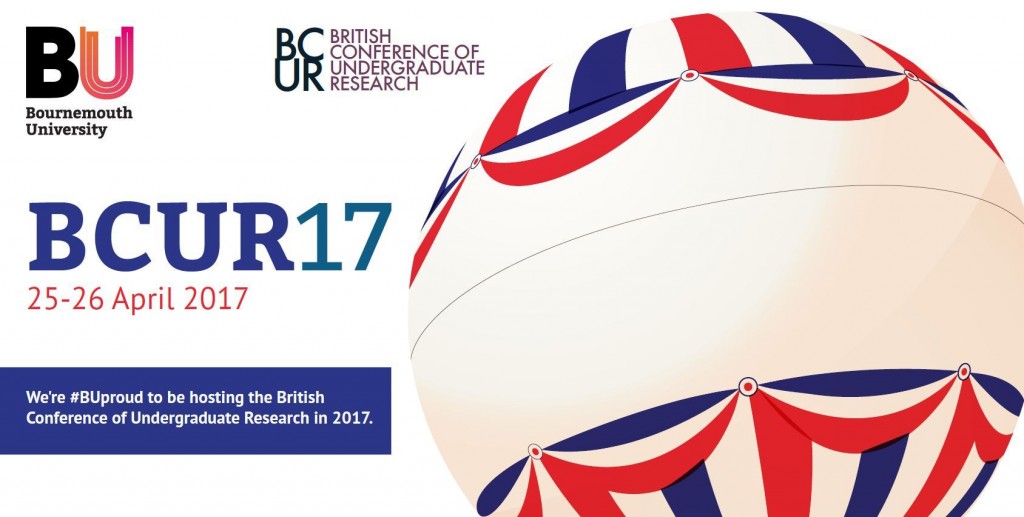
Next spring, Bournemouth University (BU) will be welcoming undergraduates from all over the country to present their research as part of the British Conference of Undergraduate Research (BCUR). The prestigious annual conference is a chance to celebrate the valuable contribution of research from undergraduate students across a vast array of disciplines and subject areas.
Undergraduates from all disciplines will be invited to submit papers, posters, workshops and performances as part of the conference. Abstracts will be peer-reviewed and those accepted will be invited to attend the conference, which is taking place in Bournemouth 25 – 26 April 2017.
Abstract submission is currently open and we’d like to see plenty of entries from BU students – it’s a great opportunity for them to share their work and develop confidence in their presentation skills. Please do encourage your students to submit an abstract. The deadline is 10 December.
Guidance about abstract submission can be found here and a drop session will take place in PG30a on Monday 5 December 1pm – 2pm for any students who want to talk through their ideas with someone from BU’s BCUR organising committee.
For more information about the conference and details of how to submit abstracts, please visit www.bournemouth.ac.uk/bcur17 or email bcur17@bournemouth.ac.uk.
Santander Mobility Awards 15 x £1,000
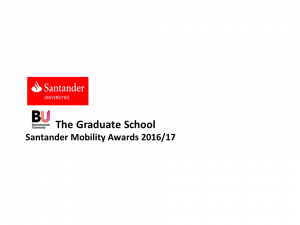
In collaboration with Santander, the Graduate School have fifteen £1,000 mobility funds to support personal and professional development relating to your research, for Postgraduate Researchers and Postgraduate Taught (Master’s) Students.
Visit the Graduate School Fees and Funding Support for terms and conditions and to apply. Closing date for applications: 7th December 2016
ESRC – UK in a Changing Europe – Brexit Priority Grants
 Pre-call announcement
Pre-call announcement
The ESRC will shortly be launching a call under the UK in a Changing Europe initiative for Brexit Priority Grants. These are to support additional activity (including research synthesis and potential new short-term research activity) related to the process of the UK leaving the European Union.
The grants will be between £100,000 and £300,000 (100 per cent fEC, with the ESRC contributing 80 per cent fEC) and for a duration of up to 18 months. The ESRC expects grants to commence on 1 April 2017.
Whilst grants under the call will be able to support new research, grant holders will be expected to undertake stakeholder and public engagement activity throughout the grant’s duration. Grant holders will also be expected to work closely with the initiative, led by Director Professor Anand Menon in communicating the research.
The ESRC intends to launch the call at the beginning of December 2016, and it is expected to close at 16.00 on 25 January 2017.
The following initial themes have been identified as potential priorities:
- Key policy areas and their impact on the UK: the single market and its implications for trade, labour market dynamics, and internal migration (within Europe); financial services regulation, monetary policy, and the future of the eurozone; the EU’s external relations; policies relating to internal security and justice; energy and environmental policy.
- The UK and the workings of European institutions: European institutions, democracy, governance, regulation; the influence of member states and sub-national regions on EU decision making; the implications of multi speed integration, including of further eurozone integration on non euro members; legal aspects of membership and non-membership.
- Attitudes towards the EU: Social and political attitudes; the nature of euroscepticism; the role of the media in shaping public and political attitudes.
- A Changing UK: The impact of legal, constitutional, policy and political change in the UK on the relationship.
If you are interested in applying then please contact your RKEO Funding Development Officer in the first instance.
14:Live with Dr Ashley Woodfall returns on Thursday!
Do you want to get creative for an hour? Do you have an interest in creative research methods?
14:Live is back tomorrow on Thursday 17 November with Dr Ashley Woodfall!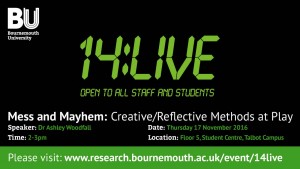
Join us as we get creative and discuss Mess and Mayhem: Creative/Reflective Methods at Play. This mess and discussion led session will be a space to discuss the use (and abuse) of creative research methods. How can they help trigger meaningful research interactions, and how the outcomes might be understood?
This session will be exploring research in a creative environment from drawing, to molding, to improv’ and beyond. We ask if creative reflective methods can share something of your own life world and whether these methods can help unlock metaphorical insights that are missed through more traditional approaches.
Come along on at 14:00-15:00 on Floor 5 of the Student Centre for an hour of mess and mayhem. There will be free drinks and snacks!
If you have any questions then please contact Hannah Jones











 Expand Your Impact: Collaboration and Networking Workshops for Researchers
Expand Your Impact: Collaboration and Networking Workshops for Researchers Visiting Prof. Sujan Marahatta presenting at BU
Visiting Prof. Sujan Marahatta presenting at BU 3C Event: Research Culture, Community & Can you Guess Who? Thursday 26 March 1-2pm
3C Event: Research Culture, Community & Can you Guess Who? Thursday 26 March 1-2pm UKCGE Recognised Research Supervision Programme: Deadline Approaching
UKCGE Recognised Research Supervision Programme: Deadline Approaching ECR Funding Open Call: Research Culture & Community Grant – Apply now
ECR Funding Open Call: Research Culture & Community Grant – Apply now ECR Funding Open Call: Research Culture & Community Grant – Application Deadline Friday 12 December
ECR Funding Open Call: Research Culture & Community Grant – Application Deadline Friday 12 December MSCA Postdoctoral Fellowships 2025 Call
MSCA Postdoctoral Fellowships 2025 Call ERC Advanced Grant 2025 Webinar
ERC Advanced Grant 2025 Webinar Update on UKRO services
Update on UKRO services European research project exploring use of ‘virtual twins’ to better manage metabolic associated fatty liver disease
European research project exploring use of ‘virtual twins’ to better manage metabolic associated fatty liver disease